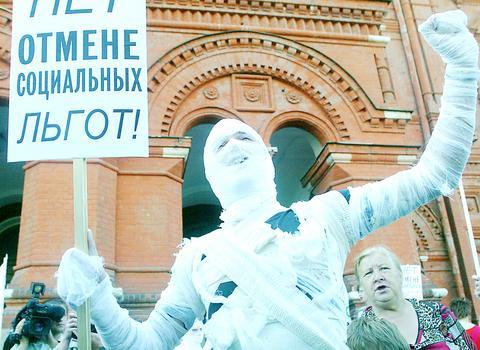A bill to end an array of Soviet-era benefits for the elderly and disabled, including free transportation and medicine, was approved by the lower house of Russia's parliament yesterday, making the measure almost certain to become law.
The government-backed legislation was approved 309-118 in the 450-seat State Duma, which is dominated by the pro-Kremlin United Russia party. Communist and nationalist legislators vehemently opposed it.

PHOTO: REUTERS
"This law contradicts the constitution and is against the people," said Communist lawmaker Valentin Romanov.
A small group of elderly protesters stood across the street from the Duma building, but the gathering was far smaller than large protests that had gathered in weeks against the legislation.
With the Duma's approval, the measure now goes to the Federation Council, the upper chamber that is seen as largely a rubber-stamp mechanism for the Kremlin. The council is expected to approve the bill on Sunday, after which it would be presented to President Vladimir Putin to be signed into law.
The measure calls for ending many of the long-standing benefits received by tens of millions of Russia's most vulnerable citizens, including the elderly, the disabled and World War II veterans, and to replace them with cash payments.
The government says the move to strip many of the Soviet-era benefits is a key step toward streamlining a lumbering bureaucracy and will be a boon to many. But recipients are outraged at what they see as abandonment by the state they served.
"The benefits have been given by the state to those who have deserved them by labor or heroic deeds and taking them away is like spitting in people's faces," said Valentina Ivanova, 67, a demonstrator.
"What they are doing is putting us in our coffins alive," she said.
The bill affects an estimated 30 million people, who constitute Russia's most vulnerable population segments.
It eliminates free access to urban transportation, free home phone use for local calls, free provision of artificial limbs, job guarantees for the disabled and, for many, free medicine. In return, they'll get monthly cash payments ranging from 1,550 rubles (US$53) down to 150 rubles (US$5.10).
Proponents of the bill say substituting cash for benefits will make aid more accurately targeted -- arguing, for example, that public transportation is scarce in rural areas.
But opponents have a raft of arguments: cash payments are vulnerable to inflation, the notoriously inefficient Russian authorities may fall months behind in the payments and the cash payments won't be enough to make up for the losses.
Under a so-called "social package" provision, medicine and some other benefits such as suburban train transport will be provided. But recipients of the social package will have 450 rubles (US$15.50) a month deducted from their new compensation payments; it is also not clear whether all the medicines currently provided free would be included in the package.

‘UNUSUAL EVENT’: The Australian defense minister said that the Chinese navy task group was entitled to be where it was, but Australia would be watching it closely The Australian and New Zealand militaries were monitoring three Chinese warships moving unusually far south along Australia’s east coast on an unknown mission, officials said yesterday. The Australian government a week ago said that the warships had traveled through Southeast Asia and the Coral Sea, and were approaching northeast Australia. Australian Minister for Defence Richard Marles yesterday said that the Chinese ships — the Hengyang naval frigate, the Zunyi cruiser and the Weishanhu replenishment vessel — were “off the east coast of Australia.” Defense officials did not respond to a request for comment on a Financial Times report that the task group from

Asian perspectives of the US have shifted from a country once perceived as a force of “moral legitimacy” to something akin to “a landlord seeking rent,” Singaporean Minister for Defence Ng Eng Hen (黃永宏) said on the sidelines of an international security meeting. Ng said in a round-table discussion at the Munich Security Conference in Germany that assumptions undertaken in the years after the end of World War II have fundamentally changed. One example is that from the time of former US president John F. Kennedy’s inaugural address more than 60 years ago, the image of the US was of a country

DEFENSE UPHEAVAL: Trump was also to remove the first woman to lead a military service, as well as the judge advocates general for the army, navy and air force US President Donald Trump on Friday fired the chairman of the Joint Chiefs of Staff, Air Force General C.Q. Brown, and pushed out five other admirals and generals in an unprecedented shake-up of US military leadership. Trump wrote in a post on Truth Social that he would nominate former lieutenant general Dan “Razin” Caine to succeed Brown, breaking with tradition by pulling someone out of retirement for the first time to become the top military officer. The president would also replace the head of the US Navy, a position held by Admiral Lisa Franchetti, the first woman to lead a military service,

BLIND COST CUTTING: A DOGE push to lay off 2,000 energy department workers resulted in hundreds of staff at a nuclear security agency being fired — then ‘unfired’ US President Donald Trump’s administration has halted the firings of hundreds of federal employees who were tasked with working on the nation’s nuclear weapons programs, in an about-face that has left workers confused and experts cautioning that the Department of Government Efficiency’s (DOGE’s) blind cost cutting would put communities at risk. Three US officials who spoke to The Associated Press said up to 350 employees at the National Nuclear Security Administration (NNSA) were abruptly laid off late on Thursday, with some losing access to e-mail before they’d learned they were fired, only to try to enter their offices on Friday morning